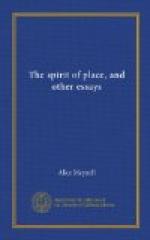It is the merry beggar who has so lamentably disappeared. If a beggar is still merry anywhere, he hides away what it would so cheer and comfort us to see; he practises not merely the conventional seeming, which is hardly intended to convince, but a more subtle and dramatic kind of semblance, of no good influence upon the morals of the road. He no longer trusts the world with a sight of his gaiety. He is not a wholehearted mendicant, and no longer keeps that liberty of unstable balance whereby an unattached creature can go in a new direction with a new wind. The merry beggar was the only adventurer free to yield to the lighter touches of chance, the touches that a habit of resistance has made imperceptible to the seated and stable social world.
The visible flitting figure of the unfettered madman sprinkled our literature with mad songs, and even one or two poets of to-day have, by tradition, written them; but that wild source of inspiration has been stopped; it has been built over, lapped and locked, imprisoned, led underground. The light melancholy and the wind-blown joys of the song of the distraught, which the poets were once ingenious to capture, have ceased to sound one note of liberty in the world’s ears. But it seems that the grosser and saner freedom of the happy beggar is still the subject of a Spanish song.
That song is gay, not defiant it is not an outlaw’s or a robber’s, it is not a song of violence or fear. It is the random trolling note of a man who owes his liberty to no disorder, failure, or ill-fortune, but takes it by choice from the voluntary world, enjoys it at the hand of unreluctant charity; who twits the world with its own choice of bonds, but has not broken his own by force. It seems, therefore, the song of an indomitable liberty of movement, light enough for the puffs of a zephyr chance.
THE LADIES OF THE IDYLL
Little Primrose dames of the English classic, the wife and daughters of the Vicar of Wakefield have no claim whatever to this name of lady. It is given to them in this page because Goldsmith himself gave it to them in the yet undepreciated state of the word, and for the better reason that he obviously intended them to be the equals of the men to whom he marries them, those men being, with all their faults, gentlemen. Goldsmith, in a word, meant them to be ladies, of country breeding, but certainly fit for membership of that large class of various fortune within which the name makes a sufficient equality.
He, their author, thought them sufficient. Having amused himself ingeniously throughout the story with their nameless vulgarities, he finally hurries them into so much sentiment as may excuse the convention of heroes in love. He plays with their coarseness like a perfectly pleased and clever showman, and then piously and happily shuts up his couples—the gentle Dr. Primrose with his abominable Deborah; the excellent Mr. Burchell with the paltry Sophia; Olivia—but no, Olivia is not so certainly happy ever after; she has a captured husband ready for her in a state of ignominy, but she has also a forgotten farmer somewhere in the background—the unhappy man whom, with her father’s permission, this sorry heroine had promised to marry in order that his wooing might pluck forward the lagging suit of the squire.




